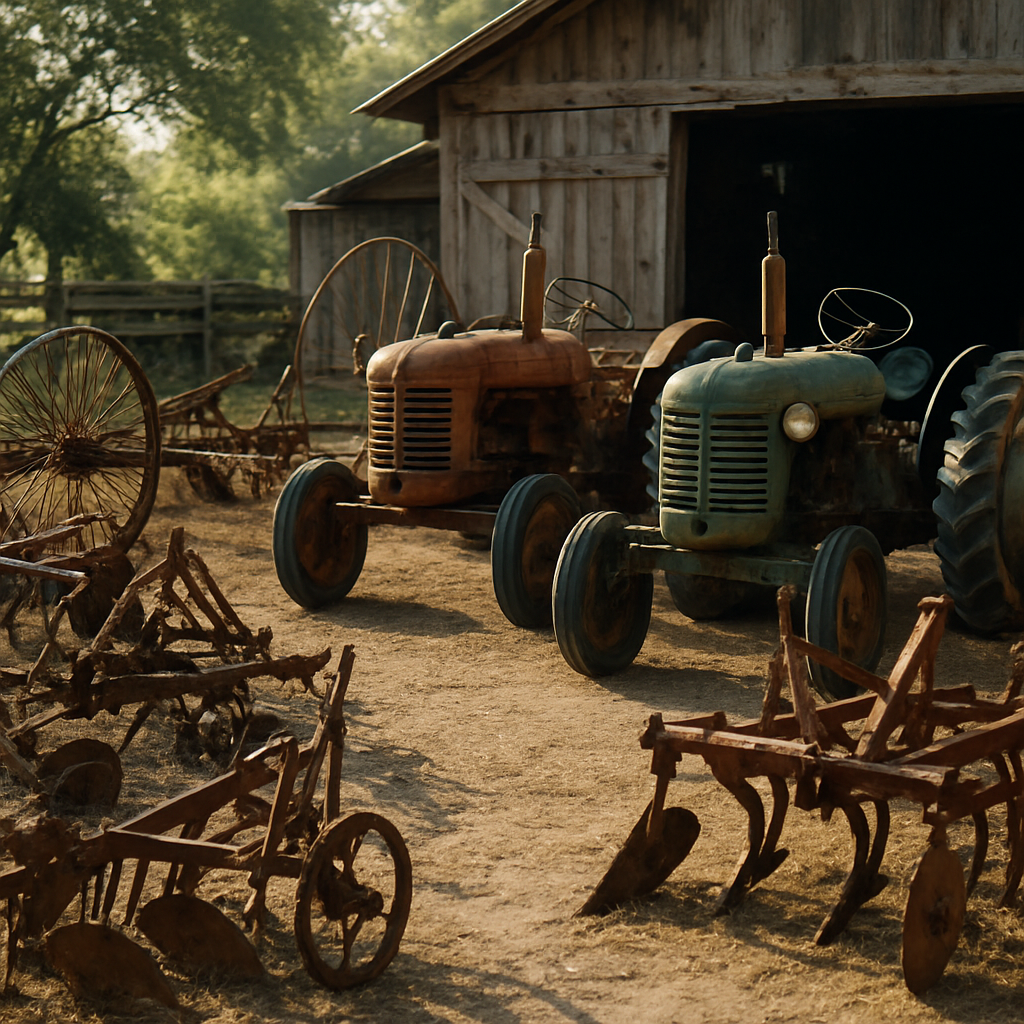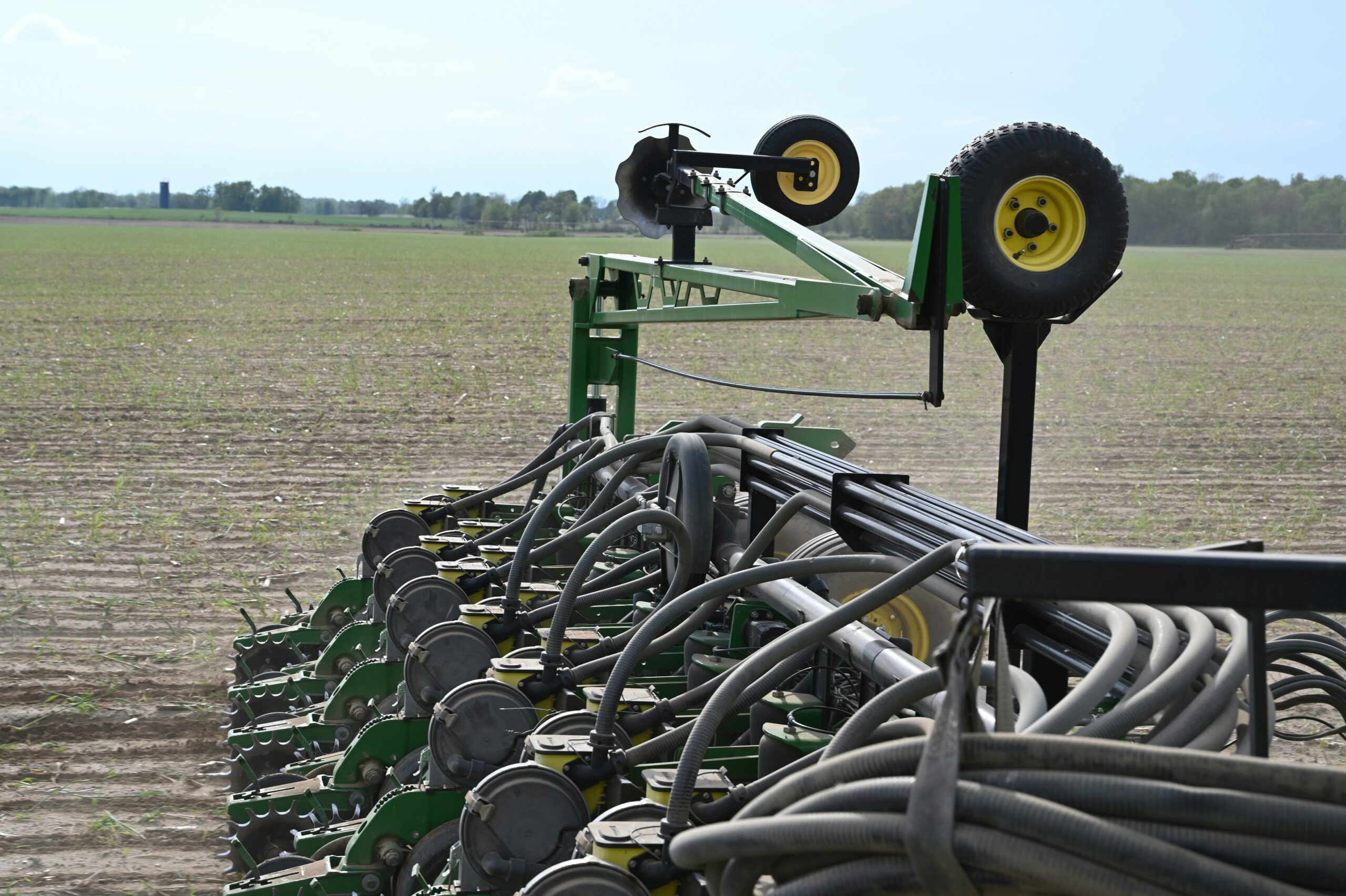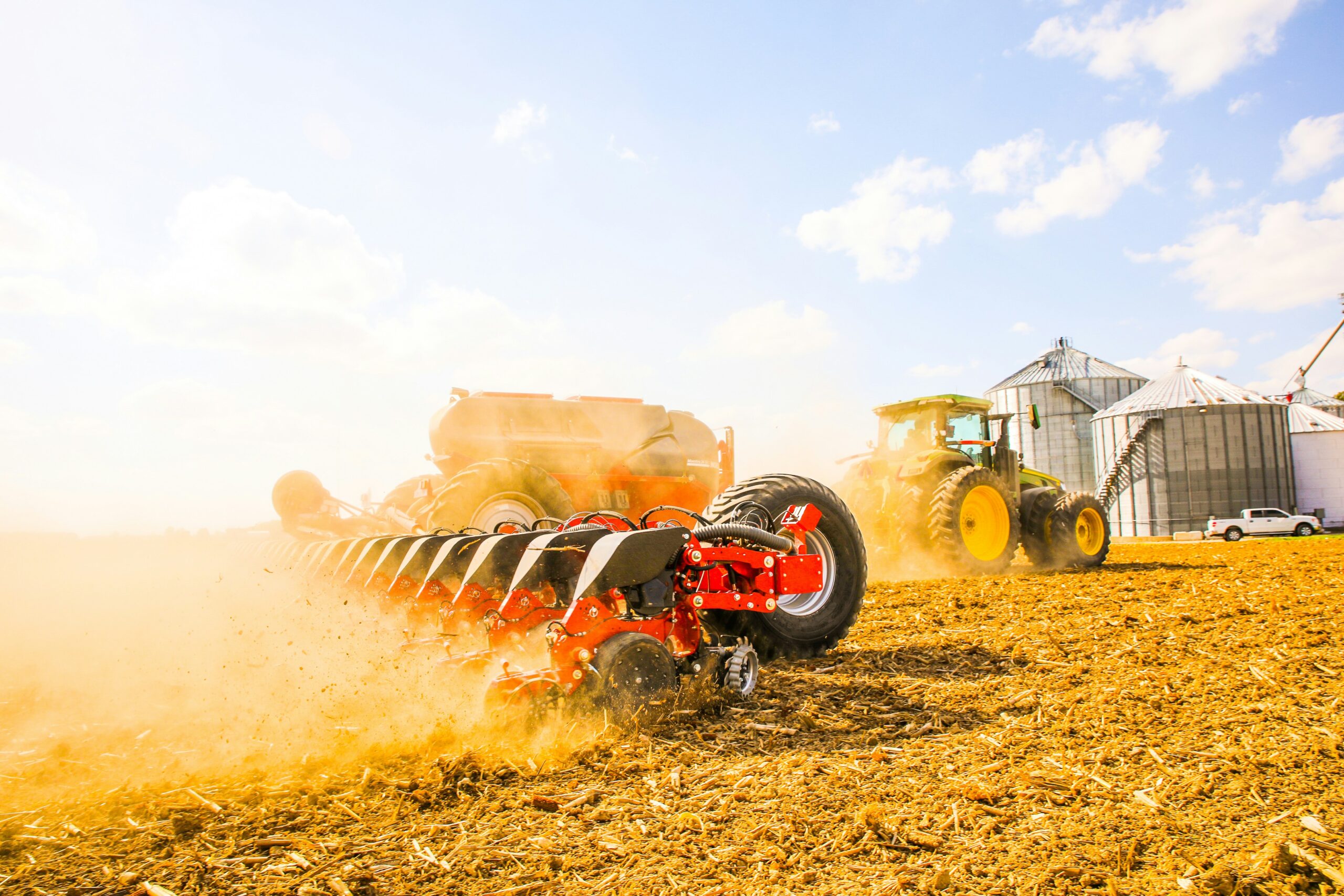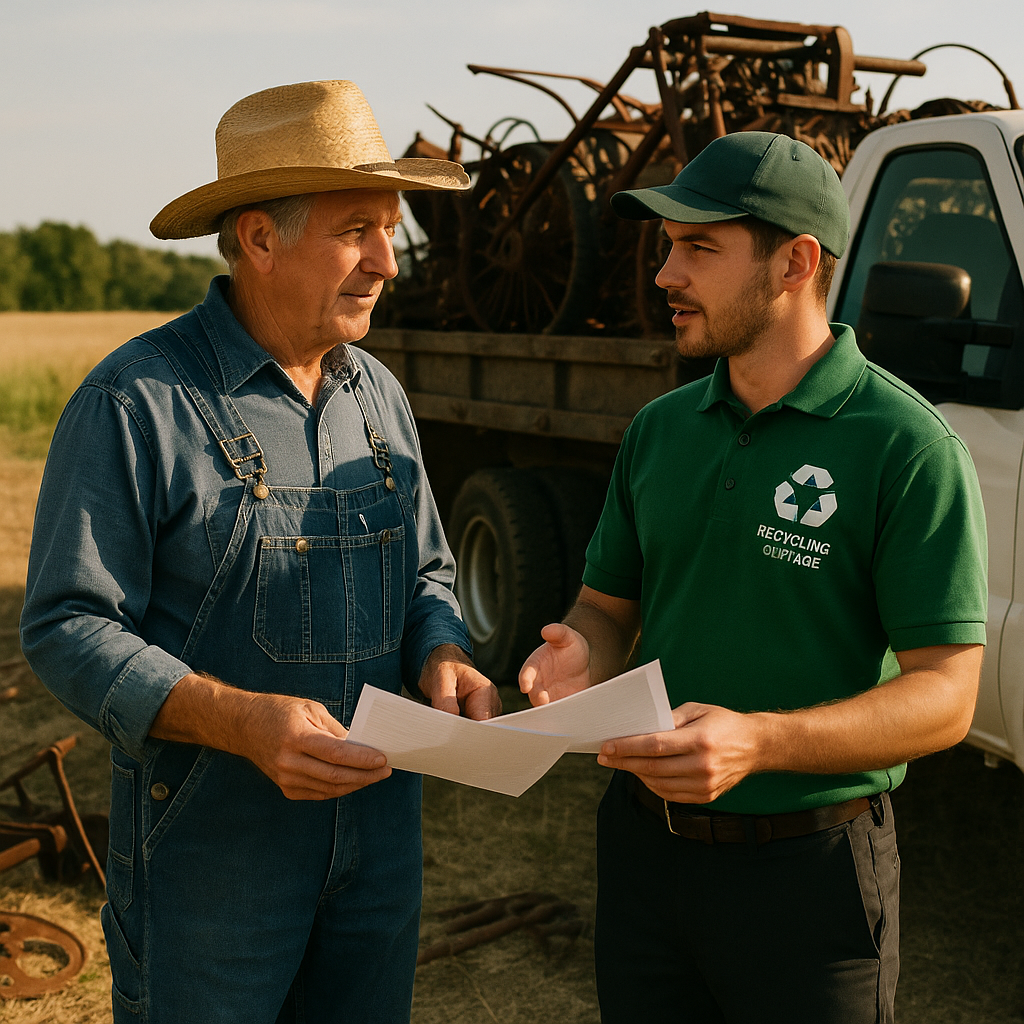5901 Botham Jean Blvd, Dallas, TX 75215
Farm Equipment Recycling: Turning Obsolete Machinery into Sustainable Resource
July 6, 2025Farm equipment recycling transforms outdated agricultural machinery into valuable resources instead of letting it rust away. This process involves responsibly dismantling old tractors, combines, plows, and other farm implements to recover metals, plastics, and rubber components.
For farmers across the country, recycling offers a practical solution to a common problem. Agricultural operations often accumulate non-functioning equipment that takes up valuable space and poses potential safety hazards. Rather than serving as eyesores, these machines can become both environmental and economic assets.
When farmers partner with specialized scrap metal services, they not only clear their properties of unused equipment but also often receive compensation for the materials recovered. This process supports local economies while contributing to broader resource conservation efforts that benefit the agricultural community as farming practices evolve toward greater sustainability.
What Types of Farm Equipment Can Be Recycled?

Farm operations utilize diverse machinery that eventually becomes obsolete. Fortunately, most agricultural equipment is composed of valuable materials that can be recycled. Nearly all components of farm machinery have recycling potential.
Large Agricultural Machinery
Tractors, the backbone of any farm, are highly recyclable due to their significant metal content. Their steel frames, engine components, and aluminum parts can be processed at scrap facilities. Combines and harvesters, with their complex mechanical systems, also contain large amounts of recyclable metals.
Plows, tillers, and cultivators are primarily made of steel, making them ideal candidates for metal recycling. These implements generally have minimal non-recyclable components, allowing for efficient processing. Farm wagons and carts, mainly consisting of steel frames and rubber tires, can be dismantled and recycled separately.
Specialized Equipment
Hay balers contain recyclable metals in their frames and mechanical components, with belts typically made from recyclable synthetic materials. Irrigation systems feature aluminum pipes, plastic parts, and copper wiring that recyclers can process separately.
Livestock feeding equipment, including automated systems, contains valuable recyclable metals and electronics. Grain storage systems and silos, although challenging to dismantle, have significant amounts of recyclable steel and aluminum.
Component Materials
Steel is the primary recyclable material in farm equipment. It can be processed into new products with minimal quality loss. Aluminum components, found in engine parts, irrigation systems, and lightweight equipment, are highly valuable in recycling markets.
Various plastics are used in farm equipment, including LDPE (Low-Density Polyethylene), PP (Polypropylene), and HDPE (High-Density Polyethylene). These can be separated and processed accordingly. Rubber from tires and belts requires specialized recycling but can be reused for playground surfaces, athletic fields, or asphalt mixtures.
Batteries from equipment contain lead, acid, and plastic casings that require careful handling during recycling. Electronic components in modern machinery contain precious metals that specialized e-waste recyclers can recover.
| Farm Equipment Type | Recyclable Material | Recycling Value |
|---|---|---|
| Tractors | Steel, Aluminum | High value due to metal content |
| Combines | Steel, Aluminum | Complex mechanical systems, high metal content |
| Plows and Tillers | Steel | Ideal for metal recycling |
| Hay Balers | Metal frames, Synthetic materials | Metals and synthetic belts |
| Irrigation Systems | Aluminum, Plastic, Copper | Reusable metals and plastics |
| Livestock Feeding Equipment | Metals, Electronics | Valuable metal and electronic components |
| Silos and Grain Storage | Steel, Aluminum | Significant amounts of recyclable metals |
Preparing Farm Equipment for Recycling
Before recycling, drain all fluids, including oil, hydraulic fluid, and fuel, as these require separate disposal through hazardous waste programs. Remove batteries and electronic components for specialized recycling channels. Clean equipment thoroughly to remove dirt, vegetation, and contaminants that might complicate the recycling process.
Some scrap facilities can handle complete farm equipment, while others may require partial dismantling. Contact your local scrap metal recycler to understand their specific requirements. Larger equipment may qualify for on-site pickup services, eliminating transportation challenges for farmers.
How Do You Prepare Farm Equipment for Recycling?

Preparing agricultural machinery for recycling requires careful planning and adherence to environmental regulations. Farm equipment contains various hazardous materials that must be properly managed before recycling. Following a systematic approach ensures both safety and compliance while maximizing the recyclable value of your equipment.
Remove Hazardous Materials First
Before dismantling, identify and remove all hazardous components. Farm equipment often contains materials like lead-acid batteries, mercury switches, and electronic components needing special handling.
Agricultural batteries are classified as hazardous waste and cannot be discarded in regular garbage. Regulations require returning automotive batteries to service stations or auto supply stores for recycling. Typically, a $5 surcharge when purchasing a new battery is waived upon returning the old one.
Electronic components in modern farm equipment contain hazardous materials such as lead, mercury, and cadmium. While safe during use, these materials pose environmental hazards when improperly discarded. Remove control panels, GPS systems, and other electronics for separate recycling.
Drain All Fluids Completely
Drain and properly dispose of all fluids in farm equipment before recycling to protect the environment and ensure safety.
Engine oil and transmission fluid must be drained into appropriate containers. It’s illegal to discard these fluids in garbage or down drains. Farms generating more than 25 gallons of used oil monthly must comply with specific regulations for used oil generators. For smaller amounts, store used oil in clean plastic containers with tight covers.
Hydraulic fluid, coolant, and brake fluid should be drained into separate containers to prevent mixing. Antifreeze is particularly hazardous due to its sweet smell and poisonous nature, requiring careful handling to keep it away from children and pets. Never dispose of these fluids at the curb or down drains.
Dismantle Equipment Strategically
Break down large farm machinery into manageable components for efficient recycling with planning and appropriate tools.
Separate major components by material type. Steel, aluminum, copper, and other metals should be grouped separately as they have different recycling processes and values. Remove non-metallic parts like rubber hoses, plastic components, and glass to prevent contamination of metal recycling streams.
For oversized equipment like combines or tractors, disassemble into sections that can be transported safely. This might require properly managed cutting equipment. As dismantling requires technical knowledge, consult equipment manuals or professionals if needed.
Document the Recycling Process
Proper documentation throughout the recycling process protects against potential liability and ensures regulatory compliance.
Keep records of all hazardous materials removed and their disposal method, including receipts from service stations accepting used oil or batteries. For larger operations generating significant amounts of hazardous waste, maintain documentation demonstrating compliance with regulations.
When transferring equipment to recycling facilities, obtain proper receipts or certificates of recycling to prove responsible disposal. These documents can be important for business records or environmental compliance.
Partner with Certified Recycling Facilities
Partnering with reputable recycling facilities ensures proper handling of farm equipment and compliance with regulations.
Certified facilities have the expertise and equipment to process agricultural machinery safely. They understand the complex regulations governing different materials and ensure each component is recycled or disposed of according to environmental standards.
Specialized equipment or components with particularly hazardous materials may require specialized handlers. Research facilities in your area that handle agricultural equipment and understand its unique challenges.
| Material | Proper Disposal Method |
| Lead-acid batteries | Return to service stations or auto supply stores for recycling |
| Electronic components (e.g., control panels, GPS systems) | Separate recycling for electronics containing lead, mercury, and cadmium |
| Engine oil and transmission fluid | Drain into containers; comply with specific regulations for used oil generators if over 25 gallons/month |
| Hydraulic fluid, coolant, and brake fluid | Drain into separate containers; never dispose of at curb or down drains |
| Antifreeze | Handle carefully, keep away from children and pets |
Proper preparation of farm equipment for recycling protects the environment and maximizes the materials’ recovered value. By systematically removing hazardous components, draining fluids, dismantling strategically, and working with certified recyclers, farmers can ensure their equipment is recycled safely and legally.
What Are the Benefits of Recycling Farm Equipment?

Environmental Benefits
Recycling farm equipment significantly reduces the amount of waste sent to landfills. Agricultural machinery contains valuable metals and materials that can persist in landfills for decades if not properly recycled. By choosing recycling over disposal, farmers prevent potentially harmful fluids and components from contaminating soil and water sources.
Resource conservation is another key benefit. The recycling process recovers valuable ferrous and nonferrous metals from tractors, combines, and other farm implements. This recovery reduces the need for new raw material extraction, which often involves environmentally damaging mining and processing operations.
Energy savings also make recycling farm equipment worthwhile. Manufacturing new agricultural machinery from recycled materials typically uses significantly less energy than production from virgin resources. This energy reduction translates to decreased carbon emissions and a smaller environmental footprint for the agricultural sector.
Economic Advantages for Farmers
Recycling obsolete or damaged farm equipment can generate direct income for agricultural operations. Many recycling facilities pay for scrap metal based on weight and material type, providing an immediate financial return on equipment that would otherwise just incur disposal costs.
The economic benefits extend beyond immediate cash value. Farmers who regularly recycle equipment avoid disposal fees and potential environmental compliance issues associated with improper waste management. Some regions even offer tax incentives for businesses that implement comprehensive recycling programs.
Additionally, participating in equipment recycling often provides access to more affordable refurbished parts. This circular approach to equipment management can significantly reduce operational costs while extending the useful life of remaining machinery.
Broader Economic and Social Impact
Farm equipment recycling makes a meaningful contribution to the broader economy. According to the EPA’s Recycling Economic Information Report, recycling activities in the United States created approximately 681,000 jobs and generated $37.8 billion in wages in 2012. The ferrous metals sector, which includes farm equipment recycling, was the top contributor to these economic indicators.
Local communities benefit when agricultural operations engage in recycling. The process creates jobs in collection, processing, and manufacturing sectors, often supporting rural economies where agricultural activities are concentrated.
The recycling industry also generates substantial tax revenue. The same EPA report indicated that recycling activities produced $5.5 billion in tax revenue nationwide, supporting essential community services and infrastructure improvements.
Supporting Sustainable Farming Practices
Equipment recycling aligns perfectly with broader sustainable farming initiatives. By prioritizing recycling, farmers demonstrate environmental stewardship that often extends to other aspects of their operations, improving community relations and consumer perception.
Modern consumers increasingly consider environmental impact in their purchasing decisions. Farms that implement comprehensive recycling programs can leverage these practices in their marketing efforts, potentially commanding premium prices for their products.
The circular economy approach to equipment management also encourages innovation in agricultural machinery design. Manufacturers respond to recycling demand by creating equipment with more recyclable components and easier end-of-life disassembly.
From environmental protection to economic benefits, recycling farm equipment delivers advantages across multiple fronts. As agriculture evolves toward more sustainable practices, equipment recycling represents a practical step with both immediate and long-term benefits.
| Category | Gross Totals | Economic Share |
| Jobs | 681,000 | 0.47% of the U.S. economy |
| Wages | $37.8 billion | 0.58% of the U.S. economy |
| Taxes | $5.5 billion | 0.78% of the U.S. economy |
How to Choose a Farm Equipment Recycling Service

Selecting the right farm equipment recycling service requires careful consideration of several key factors. Proper disposal of agricultural machinery involves more than just clearing space—it’s about ensuring environmental compliance while maximizing the recovery of valuable materials.
The first criterion to examine is proper certification. Look for recyclers who hold EPA-approved certifications, particularly those with Section 608 or Section 609 technician certifications. These credentials verify that technicians are trained to handle refrigerants properly, which is critical when recycling equipment with cooling systems.
Certifications and Compliance
EPA regulations specifically govern the servicing of cooling equipment used in farm machinery. Certified technicians must follow strict protocols for refrigerant recovery, preventing harmful substances from being released into the atmosphere. When evaluating potential recyclers, ask directly about their technician certification status.
Not all recycling facilities maintain the same standards. Request documentation of their EPA compliance history and verify they follow the Clean Air Act regulations under 40 CFR 82. This demonstrates their commitment to legal and environmental responsibilities.
Remember that venting refrigerants from farm equipment is illegal under federal law, with carbon dioxide (R-744) being the only exception. Responsible recyclers will emphasize their refrigerant recovery procedures and explain how they handle these materials safely.
Service Capabilities and Convenience
Assess the recycler’s material handling capabilities relative to your specific equipment needs. Agricultural machinery often contains a mix of metals, plastics, fluids, and electronic components, each requiring different recycling approaches.
Convenience factors matter significantly for farmers with large or immobile equipment. Many EPA-compliant service providers offer mobile servicing options, bringing their recovery equipment directly to farms, construction sites, and other locations, thus eliminating the logistical challenge of transporting large machinery.
Some states and localities restrict mobile servicing practices. Confirm that your chosen recycler operates legally in your area when providing on-site services. A reputable company will know the local regulations and operate accordingly.
| Recycling Method | Cost | Convenience | Best For |
|---|---|---|---|
| On-Site Dismantling | Low | Requires expertise | Large farms with tools and knowledge |
| Off-Site Recycling | Moderate | Minimal involvement | Farms of all sizes |
| Professional Hauling | High | Maximum convenience | Farms handling hazardous materials |
Evaluating Track Record and Experience
Experience with agricultural machinery specifically is invaluable. Farm equipment often presents unique challenges compared to other types of machinery. Providers familiar with farm equipment will better understand how to dismantle and process these specialized machines.
Request references from other agricultural clients. Farms that have previously used the recycler can provide insights into the company’s reliability, thoroughness, and professionalism. This firsthand feedback often reveals more than official credentials alone.
Review the recycler’s disposal protocols for potentially hazardous materials. Farm equipment may contain oils, hydraulic fluids, batteries, and other components requiring special handling. Responsible recyclers will clearly explain their processes for managing these materials.
Final Selection Considerations
Transparency about their recycling process matters. Reputable companies willingly explain where materials go after collection. They should be able to describe how different components are processed, recycled, or disposed of appropriately.
Cost should not be the primary selection factor. While pricing is important, choosing solely based on the lowest price often leads to compromised environmental standards. Instead, evaluate the overall value, including compliance, convenience, and comprehensive service.
Documentation is essential for regulatory compliance. Select a recycler that provides certificates of proper disposal or similar documentation. These records protect you if questions arise about how your equipment was handled.
Conclusion: Embracing Sustainable Practices in Agriculture

Farm equipment recycling serves as a cornerstone of sustainable agriculture. When farmers responsibly recycle outdated machinery, they directly contribute to conserving resources by reducing the demand for the raw materials needed to manufacture new equipment. This practice also cuts greenhouse gas emissions associated with the production and disposal of farm equipment while potentially providing financial returns through metal reclamation.
Achieving environmental responsibility in agriculture involves embracing these circular practices. By prioritizing equipment recycling, farmers not only protect valuable resources but also foster innovation in the agricultural sector. This shift toward sustainability offers a practical approach to addressing modern farming challenges while preserving our environmental heritage for future generations. Contact Okon Recycling at 214-717-4083 for your recycling needs.
